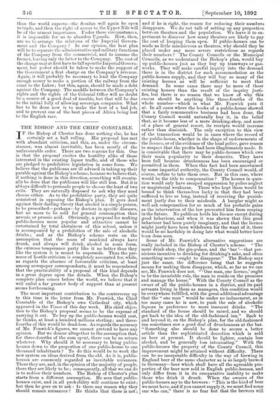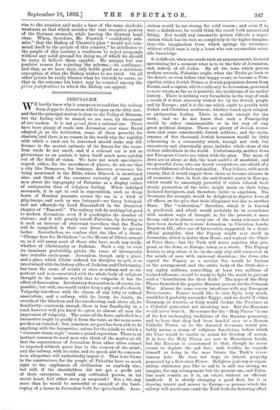THE BISHOP AND THE CHIEF CONSTABLE.
IF the Bishop of Chester has done nothing else, he has certainly set a ball rolling. His proposal has met with abundant criticism, and this, as, under the circum- stances, was almost inevitable, has been mostly of the unfavourable order. There are two reasons for this. One is that the proposal excites the hostility alike of those interested in the existing liquor traffic, and of those who are pledged to prohibitive legislation in some form. We believe that the publicans are ill advised in taking up their parable against the Bishop's scheme, because we believe that, if nothing is done in this direction, something will eventu- ally be done that the publicans will like still less. But it is always difficult to persuade people to choose the least of two evils. They are naturally disposed to ask why they need choose either. As to the prohibitive party, they are quite consistent in opposing the Bishop's plan. It goes dead against their darling theory that alcohol is a simple poison, to be prescribed—perhaps—by doctors in specific diseases, but no more to be sold for general consumption than arsenic or prussic acid. Obviously, a proposal for making public-houses more popular and attractive cannot be entertained by total abstainers of this school, unless it is accompanied by a prohibition of the sale of alcoholic drinks ; and as the Bishop's scheme rests on the assumption that the mass of mankind always have drunk, and always will drink, alcohol in some form, the extreme temperance party like it no better than they like the system it is meant to supersede. Thus the pre- sence of hostile criticism is completely accounted for, while, as regards the absence of favourable criticism, at least among newspaper correspondents, it must be remembered that the practicability of a proposal of this kind depends in a great degree upon the details. When the Bishop's complete plan comes before the world, we believe that it will enlist a far greater body of support than at present seems forthcoming.
The most important contribution to the controversy up to this time is the letter from Mr. Fenwick, the Chief Constable of the Bishop's own Cathedral city, which appeared in the Times of this day week. His chief objec- tion to the Bishop's proposal seems to be the expense of carrying it out. To buy up the public-houses would cost, he thinks, at least a hundred millions sterling; and three- fourths of this would be dead-loss. As regards the accuracy of Mr. Fenwick's figures, we cannot pretend to have any opinion. But we demur altogether to the assumption that, for three-fourths of the sum spent, there can be no return whatever. Why should it be necessary to bring public- houses down to the proportion of one public-house to one thousand inhabitants ? To do this would be to work the new system on ideas derived from the old. As it is, public- houses are commonly regarded as inevitable nuisances. There they are, and, in the opinion of the majority of people, there they are likely to be ; consequently, all that we can do is to reduce their numbers. The Bishop of Chester's plan starts from a different assumption. He sees that public- houses exist, and in all probability will continue to exist ; but then he goes on to ask : Is there any reason why they should remain nuisances ? He thinks that there is not ; and if he is right, the reason for reducing their numbers disappears. We do not talk of setting up any proportion between theatres and the population. We leave it to ex- periment to discover how many theatres are likely to pay the cost of keeping them open. If public-houses can be made as little mischievous as theatres, why should they be placed under any more severe restrictions as regards their numbers ? The County Councils or the Municipal Councils, as we understand the Bishop's plan, would buy up public-houses just as they buy up tramways or gas- works. They will make careful inquiry into the demand there is in the district for such accommodation as the public-houses supply, and they will buy so many of the existing houses as will be sufficient to meet that demand. In some cases there may be more of these existing houses than the result of the inquiry justi- fies, but there is no reason that we know of why this excess should be anything like three-fourths of the whole number—which is what Mr. Fenwick puts it at. In all cases where the books of a public-house showed that a fairly remunerative business had been done, the County Council would naturally buy it, in the belief that, as it became less of a mere chinking-shop, and more of a place of general resort, its receipts would increase rather than diminish. The only exception to this view of the transaction would be in cases where the record of the public-house, whether in the shape of endorsements of the licence, or of the evidence of the local police, gave reason to suspect that the profits had been illegitimately made. It is conceivable that there may be public-houses which owe their main popularity to their demerits. They have been full because drunkenness has been encouraged or permitted in them. When this fact had been ascertained by some impartial authority, the County Council would, of course, refuse to take them over. But in this case, where would be the title to compensation ? The houses in ques- tion would only have escaped suppression by police neglect or magisterial weakness. Those who kept them would be bound to think themselves lucky in that they had been suffered to live so long, instead of receiving the punish- ment justly due to their misdeeds. A burglar might as well ask compensation for so much of his probable gains as the intervention of the law prevented him from reaping in the future. No publican holds his licence except during good behaviour, and when it was shown that this good behaviour had been purely imaginary, and that the licence might justly have been withdrawn for the want of it, there would be no hardship in doing late what would better have been done soon.
Some of Mr. Fenwick's alternative suggestions are really included in the Bishop of Chester's scheme. " The mere drink-shop, the gin-palace, and the 'bar '—that per- nicious incentive to drinking for drinking's sake, and often something more—ought to disappear." The Bishop says just the same, the difference being that he suggests means for making them disappear, which, so far as we can see, Mr. Fenwick does not. " One man, one licence,' ought to be the invariable rule, the man to reside on the premises and manage the house." With the County Council as the owner of all the public-houses in a district, and its paid servants living in them as managers, this condition would be everywhere fulfilled, with the great additional advantage that the " one man" would be under no inducement, as in too many cases he is now, to push the sale of alcoholic liquors in preference to more innocent drinks. " The standard of the house should be raised, and we should get back to the idea of the old-fashioned inn." Back to and beyond it, on the Bishop's plan, for the old-fashioned inn sometimes saw a good deal of drunkenness at the bar. " Something also should be done to secure a better article than the sophisticated decoction which is sold as beer at present. It should be lighter, contain less alcohol, and be generally less intoxicating." With the public-houses the property of the County Council, this improvement might be attained without difficulty. There can be no insuperable difficulty in the way of brewing in England beer of the same character as is so largely brewed in Germany—beer which shall have all the agreeable pro- perties of the beer now sold in English public-houses, and only differ from it in its comparative inability to make those who drink it drunk. When the owners of the public-houses say to the brewers : " This is the kind of beer we must have, and if you cannot supply it, we must find some one who can," there is no fear but that the brewers will rise to the occasion and make a beer of the same alcoholic weakness as that which satisfies the vast receptive powers of the German stomach, while leaving the German head clear. When, therefore, Mr. Fenwick " confidently sub- mits" that the Bishop of Chester's plan " would not com- mend itself to the people of this country," he attributes to the people of this country a readiness to reject proposals without any solid ground for doing so, of which we should be sorry to believe them capable. He assigns but one positive reason for rejecting the scheme,—its costliness ; and that, as we have seen, only holds good on a mistaken conception of what the Bishop wishes to see tried. On all other points he really blesses what he intends to curse, so that in the outcome his letter may be counted among the pieces justificatives to which the Bishop can appeal.



































 Previous page
Previous page